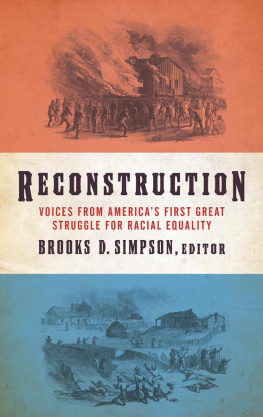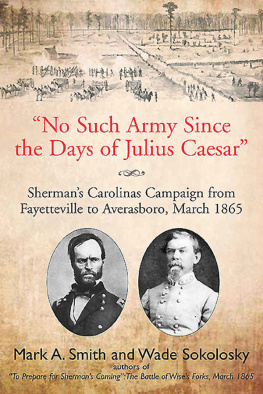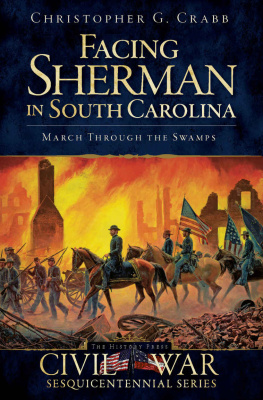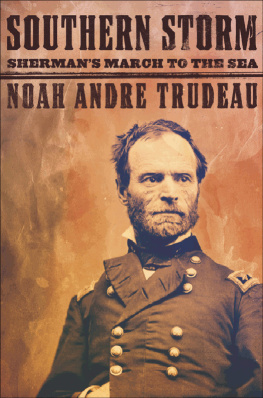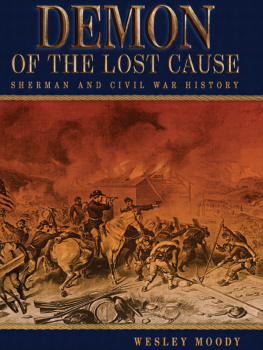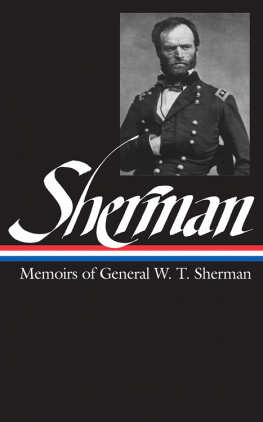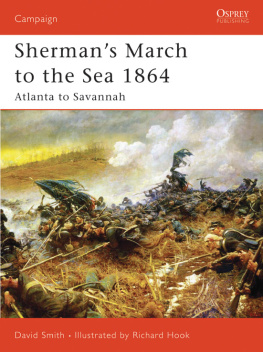Thomas Ewing Sr.
James B. McPherson
Ulysses S. Grant
Henry W. Halleck
William T. Sherman, commanding the Military Division of the Mississippi, and his generals
Major General William T. Sherman at Atlanta
Introduction
In October 1864, William T. Sherman reflected on the flood of correspondence that had descended upon him in the aftermath of his capture of Atlanta, Georgia, the previous month. He admitted to his wife that at times he wrote imprudent letters (one might add that some were also impudent). It seems that my letters now even are sought after like hot cakes; he hoped that none will be published as sample of literary composition. In words heartily endorsed by this editorial team, he added: You can read my letters & guess at the meaning, but judging from my Copy clerks, some readers would make an awful jumble of my letters, written usually in the small hours of the night, by a single candle on a box.
The letters Sherman left behind have proven a treasure trove for biographers, scholars, and students of the Civil War. Not all of what he said can be taken at face value, for usually Shermans bark was worse than his bite. Often the general wielded his pen rather than his sword in an effort to blow off steam or to outline vivid images he never intended to make real. At the same time, however, the emotion revealed in such correspondence tells much about the generals personality and psyche, his joys and sorrows, and the intensity with which he felt anger, disappointment, shame, vindication, and triumph. Say what one might about the man and the general, it remains that he was never boring, least so in his letters.
Shermans Civil War: Selected Correspondence of William T. Sherman, 1860 1865 is a selected edition of the personal and official correspondence of one of the major figures of the Civil War era. This volume is intended to serve a wide audience: biographers and other students of Shermans career, readers interested in the Civil War, military historians, and political historians. The greatest strength of Shermans Civil War lies in the letters themselves: lively, frank, opinionated, discerning, and occasionally extremely wrongheaded, they mirror the colorful personality and multifaceted mentality of the man who wrote them. It is close to being a life through letters, enabling readers to see the Civil War through Shermans eyes. They touch on such diverse issues as Northern politics, the pressure of popular expectations on military operations, the role and responsibilities of the press, the nature and intensity of Confederate resistance, justifications for the treatment of civilians in occupied areas, womens participation in the conflict, slavery, emancipation, the enlistment of blacks in the Union army, and the problems of peacemaking and reconstruction, all important to a broader understanding of the American Civil War. And Sherman had more than enough to say about such prominent individuals as Ulysses S. Grant, Abraham Lincoln, and George McClellan, as well as a host of lesser figures.
The necessity for a new, more complete, and more extensive edition of Shermans correspondence has been clear for some time. While historians and others have relied on Walter L. Fleming, ed., General Sherman as College President (1912), Rachel Sherman Thorndike, ed., The Sherman Letters: Correspondence between General and Senator Sherman from 1837 to 1891 (1894), and Mark A. DeWolfe Howe, ed., Home Letters of General Sherman (1909), a comparison of their texts with the originals reveals significant discrepancies and excisions in the published versions (as well as variations between the various editions). The editors excised or altered some of Shermans more colorful or pointed expressions of opinion, omitted descriptions of military operations, and silently corrected the generals grammar, as well as standardizing his spelling, capitalization, and punctuation. The result is a rather sanitized and somewhat misleading version of Shermans views and statements as embodied in these letters. Scholars have noted the inaccuracies and warned against too great a reliance on the printed versions.
In addition, the vast majority of the correspondence reprinted, especially in the last two editions mentioned above, was between Sherman and his wife, Ellen Ewing Sherman, and his brother, Republican politician John Sherman. A large number of Sherman letters both to these individuals and to others remained unpublished or unavailable to the general reader. Among these letters is Shermans correspondence with Ulysses S. Grant (best available through a careful perusal of the annotation to Grants letters in John Y. Simon, ed., The Papers of Ulysses S. Grant [22 vols. to date, 1967 ]) and with other generals, politicians, associates, friends, and citizens. Two major collections of Sherman material, at the Library of Congress and the University of Notre Dame, are available on microfilm, but Sherman material in other collections at the Library of Congress, the National Archives, the Huntington Library, the Ohio Historical Society, and other repositories, including private owners, remains solely in manuscript form.
Since the focus of this volume is Sherman, only letters from Sherman were considered for publication in full. To merit serious consideration for inclusion, a letter had to contain material that would help readers understand Sherman and his war. Letters that revealed Sherman the husband, the father, the general, or his opinions about politics, military operations, opposing generals, the South, slavery and emancipation, his fellow officers, or other aspects of warfare are included. Complete and accurate versions of virtually all the letters in Fleming, Thorndike, and DeHowe are included, along with other correspondence to John Sherman and Ellen Ewing Sherman not published in previous collections and letters to other family members. Some correspondence that brought to light aspects of military and political affairs is also included. Routine correspondence, requisitions, reports, and orders, usually to be found in the


